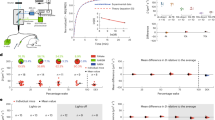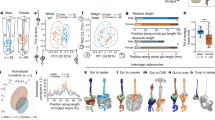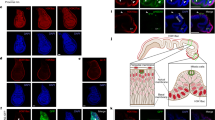Abstract
THE exposure of the pregnant female mouse to the effects of a severe degree of anoxia results in the reduction of litter size and the birth of deformed young1. The object of the present investigation was to determine whether the chances of an embryo surviving the effects of anoxia were in any way affected by the position which it occupied in the uterine horn relative to its siblings.
This is a preview of subscription content, access via your institution
Access options
Subscribe to this journal
Receive 51 print issues and online access
$199.00 per year
only $3.90 per issue
Buy this article
- Purchase on Springer Link
- Instant access to full article PDF
Prices may be subject to local taxes which are calculated during checkout
Similar content being viewed by others
References
Ingalls, T. H., Curley, F. J., and Prindle, R. A., New Eng. J. Med., 247, 758 (1952).
McLaren, A., and Michie, D., Ciba Found. Symp. Congenital Malformations, 178 (J. and A. Churchill, Ltd., London, 1960).
Woollam, D. H. M., and Millen, J. W., Nature, 190, 184 (1961).
Author information
Authors and Affiliations
Rights and permissions
About this article
Cite this article
WOOLLAM, D., MILLEN, J. Influence of Uterine Position on the Response of the Mouse Embryo to Anoxia. Nature 194, 990–991 (1962). https://doi.org/10.1038/194990a0
Issue Date:
DOI: https://doi.org/10.1038/194990a0
Comments
By submitting a comment you agree to abide by our Terms and Community Guidelines. If you find something abusive or that does not comply with our terms or guidelines please flag it as inappropriate.



